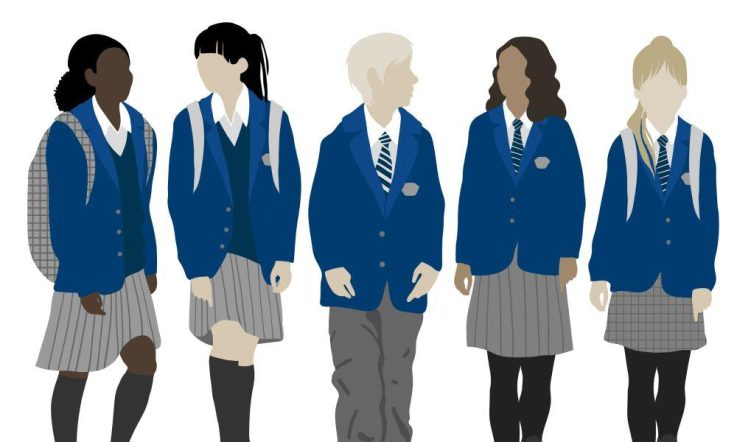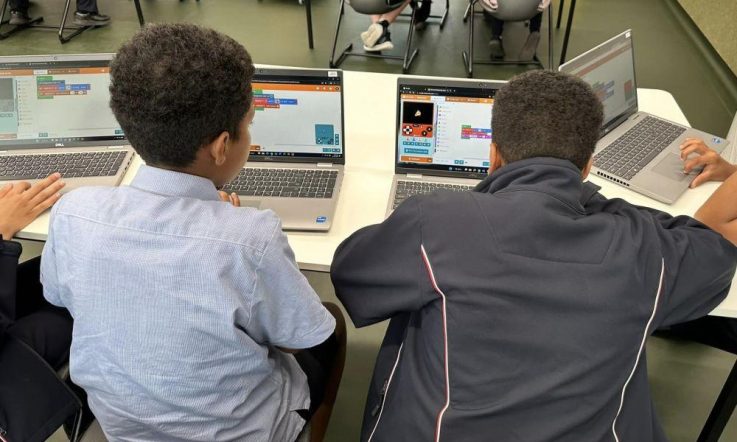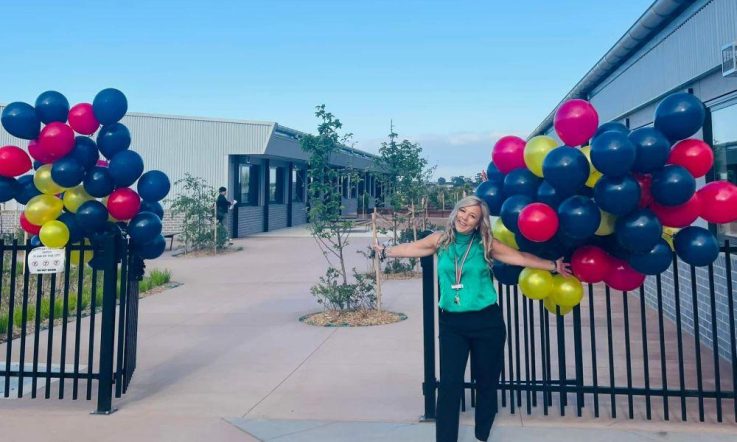This podcast from Teacher is supported by Monash University. Check out Season Two of their podcast ‘Let’s Talk Teaching’ from 18 June and join the conversation with leading academics in teacher education
Hello and thanks for downloading this podcast from Teacher, I’m Jo Earp. Welcome to Episode 9 (we’re on now, already) of the School Assembly podcast series, where we explore what it takes to build a school from the ground up. In Series 2 then, we’re following Jo Camozzato and the team at the dual campus Bemin Secondary College, that’s in the Melbourne suburb of Truganina. So, today, we’re going to be talking about that special place that secondary schools occupy in the learning journey for students – so, they’re sandwiched in between primary and post-school options. I’ll be chatting to Jo about what that means in terms of linking it all together. I hope you enjoy the episode.
Jo Earp: Hi Jo, lovely to catch up with you again. We are in May already – oh my gosh. Okay, we'll be talking about links to primary schools today and also post-school options for students. I was thinking secondary schools sandwiched in the middle of that. So, you've got to keep your focus on things that are happening now, obviously, but those links are also going on throughout the year, I guess?
Joanne Camozzato: Yeah. Hi Jo, it’s nice to hear from you again. I think schools are perpetually in motion around everything. So, those links with our primary schools (and of course we have that unique situation of Prep to 9 colleges) do continue throughout the year, but there are sort of points where it's more intense and we're probably moving towards that point now, as it starts to become busier from this term on, as our families put in their placement requests for where they want to attend school next year.
JE: Okay, then. So, I want to talk about sort of both ends of the of the scale – so, the primary thing and then also seeing students onto post-school options. But let's talk about the younger end first then, ongoing links with primary schools. Obviously as a new school, though, that's crucial as well, because that's where your intake’s coming from, isn't it? But what else needs to happen in that relationship, not just to benefit you but also the primary as well, and of course the students and the families – what needs to happen there?
JC: I think firstly it's important to understand that as principals we also build a relationship with each other and, you know, if we go back over the episodes, my relationship building with local primary school principals began last year, even when I was sitting in one of the primary schools and working out of there for the last 6 months. And we also continue to have informal conversations as principals through our network meetings. But even this week, I offered our school as a venue for a principal's breakfast meeting. And, you know, I was able to have a couple of quick catch-up conversations with some of our principals there about their concerns in regard to transitions, how many students they might be having that might attend our school next year … So, the process begins straight away, even on an informal level.
Here in Victoria in the next couple of weeks our year 6 parents are going to put in their placement and go to their local school, that's what they would like. And that all that mechanism starts happening. And of course, as we move to the middle of the year and we find out who is going to be coming to our college, we then have to plan – how do we support them, so they do have a good transition for the start of next year?
So, it really is a 6-month project, you know, collecting information, making sure we have the staffing and have the time to actually connect with all our schools. So, I've already, I'm in the process of creating a new role. I'm trying to put up another position, possibly in the next few days, where, you know, this person's role is to essentially talk to, be the linchpin, with our primary schools and also our prep to 9 feeder schools, because it's a big job. When you're in new school and you're taking in kids for many schools in the area, you have to keep track of all the information you're collecting and the data. And last year there was just 2 of us doing that and we didn't have a school or a staff to manage for that 6 months; but this year, of course, there's the campuses, our current students, our staffing, all those things are happening around us. So, it is about me finding some dedicated space for dedicated staff members to sit in this space and do this role.
JE: And what about in terms of – I was thinking, what about in terms of individual teachers? Will they ever sort of catch up with each other on, you know, individual students? What will happen sort of a bit nearer the transition time, I guess?
JC: We have our orientation day, you know, right in December and then the students begin school the following year. But during that time, we do send teams of teachers or specialised teams like the Wellbeing team to meet with key teachers at these schools. So that we collect, I suppose, more specific information about the young people. Sometimes we will also invite the parents to come and see us with one of the teachers from the primary school and we have meetings here to get to know each other to, I suppose most of the time, it's to alleviate anxiety and to be front-loaded with information.
The other thing is, too, we also provide some extra transition. Now that we have our own space, which we didn't have last year, if there are students that do have mental health issues or they have different learning needs that require them to have a bit more time getting used to this environment, we sort of tailor make a little bit of a program where they might come in an hour each week for 3 weeks, or 2 hours a week and they walk around and they get to know key faces, you know, the maps of the school, where things are, so that they build their confidence and familiarity way ahead of time before the bulk of the students come.
JE: Oh, that's interesting. Yeah. And then, like you say, you as the leader as well, you'll be catching up with the other leaders in your area. How many schools and … how many of these types of relationships do you have to sort of keep on … the plates spinning? I'm thinking it's getting quite a lot.
JC: Oh, a lot because at the primary end there's at least, you know, 3 or 4 key schools. But last year, if we look at the data from last year, being a new suburb, a lot of families had started their young children at another primary school out of the area, but they built their house close to the high school, where the high school has opened. Which means that we get a lot of young people that are not just nearby, they might be travelling, for example, one person … comes from St Albans, that's where their primary school is, but their house is here near our school in Truganina – so all of you can have a little look at that on the map. But the family have finished building their house and they've moved in, but this child was just finishing off year 6. And so, it was important for them and for that child to finish year 6 this year where all their friends were. But as you can see, that's just not a local school.
So, we have this other collection of schools nearby. And of course, we also have young people that are coming in from the non-government school sector and we can't just ignore all these children because, you know, we want everyone to achieve some success, well a lot of success when they move into high school. So, there is a lot. And then, like I said, we always have to times everything by 2 at Bemin Secondary College because then we have the year 9s coming into year 10 – and that's at least 4 if not 5 prep to 9s that possibly could send students to us, depending on where the young person lives.
And that's why you know, about 3 weeks ago, I sort of woke up in the middle of the night (principals do that sometimes, or early in the morning), kind of having another nightmare going ‘oh my goodness, who is going to do all this? Like, who? What's going on? I needed to think about this a bit earlier’. But sometimes you just can't think about everything early because you're thinking about lots of other things at the same time.
JE: Yeah, and that's it, isn't it – it’s just one of many, many, many things that you do and that your team does as well. But yeah, it's certainly an interesting perspective. And that's interesting about, yeah, the new builds and the new suburbs and I’d not really thought about that. So, yeah, if you are a new school and it's your first year, you've got all those out of suburb people coming in as well. So, yeah.
You’re listening to a podcast from Teacher magazine, supported by Monash University's Faculty of Education. Listen to their podcast ‘Let’s Talk Teaching’, hosted by former teacher, Associate Professor Rebecca Cooper, as she invites teachers and alumni with a range of educational backgrounds and experiences to share their insights and discuss practical topics to help you develop and grow as a teacher. Season Two, episode one is available from 18 June.
JE: So, at the other end then you've got transition to post-school life, whatever that might look like for students as well, haven't you? Now this foundation year, that's a little bit different, but from your previous experience then what needs to happen in those relationships? Because I'm thinking there's unis, there’s TAFEs, there’s employers, there's all kinds of different options aren’t there? So, again, what's happening on that side of things?
JC: I, think first of all, it's not too soon because some of our students have already turned 16 or 16-and-a-half and they're in year 10 and they're very clear that their pathway is not to continue in formal education. I mean, obviously we have a mantra to keep young people involved in some form of education until 17 and also to encourage them to finish year 12. But the reality is, this is not what everyone wants, and so the conversations have already started. And they start with the young people that are already beginning, or come to us a little bit disengaged – like, getting a bit impatient already. And then, of course, we've also got young people who are very much interested in a traditional university pathway and want to find how to get there quickly or what subjects they should be doing straight away, to think about for the final years of school.
But I think it's really important for us, we've tried to take on an approach that we embrace all pathways and no matter what you actually are interested in and what you're wanting to choose; that they're equally of value and that we're here to support these year 10s that have joined us only for the last 12-13 weeks. So, for example, one student has already started to do a school-based apprenticeship, and I would encourage that more for those that are suited and ready. We have a couple of hours students who leave our school regularly each week and attend a VET subject with another provider, and again I think that's fantastic, while we have students who are doing what we call early VCE study.
But I think it's important; I think all of us know, you know, it's not just about uni anymore. Students are very concerned about the large debts that they're going to get and, you know, I think that's what I meant by embracing all pathways; that, it's an expensive choice to go to university and many of them talk about it like that, ‘It's going to be expensive. I want to know that I'm choosing something that I don't have regrets about or that I don't make a mistake and I'm paying for something that I don't want to do’. So, this is another burden that I think sometimes we forget that young people do listen and hear what's going on.
And so, I, you know early on, even before we opened, I do have a leading teacher – leader in a position of Careers and Pathways – and she's been with us from day one and she's been working with students immediately, straight away. Obviously, there's also a Pathways career program that all students access, but I think it's about that one-on-one support, and even if it's about educating families on what's possible.
I also took, I suppose, up the opportunity of hosting a department initiative called Head Start. So, we have 2 Head Start workers who are based in our school. They don't just service us, we're just the base school, they go out to all the local schools, and they are talking to young people who are interested in school-based apprenticeships. And, again, you know, people often think an apprenticeship is like traditional carpentry or tiling. It sounds very sort of, yeah, traditional, stereotypical, but they seem to forget there's a whole range of other sort of traineeships out there – whether it's office traineeships, you know, that kind of work as well, business traineeships that some young people were interested in doing and doing it via a traineeship, not going to university.
So, we've tried our best in this space to begin with a bang because I don't want young people sitting in a senior campus getting frustrated and not feeling that anyone is noticing them because that's when they start to communicate with behaviour.
JE: Yeah. And also, like you said with the careers advisor and the dedicated careers person being on-site and that being a key role. Yeah, it's just making sure that students have all the information, isn't it? All the information, all the options so that they can sit and think about this, talk to their parents about it, have a think about what it is they want to do. It's when those options aren’t explained and you kind of like, you shut off certain directions because you think, ‘well, that's not for me, I don't think that's possible’, or whatever. So, yeah.
JC: Yeah, sometimes we actually have to do a bit more work with the parents rather than the young person. Because there are many, many parents who still would prefer to hear that their young person wants a university pathway. It's not that they're against apprenticeships or going to TAFE or other traineeships. It's just that I suppose sometimes for them that was what they chose, and they wish they had the opportunity or the capacity or knowledge to do further study; so they don't feel so tired, you know, working jobs that as they get older become very taxing, or in industries that sort of merge or disappear. But at the end of the day, you know, we all have different interests and we all, we need to listen to what young people want to do. And not everyone wants to do what is happening at university, which is more heavy text, reading, writing – that's not what suits everyone.
JE: Yeah, so we’ve looked at it from both sides then. We've looked at it from the primary links and the younger end, and then seeing them post-school. Okay then, we're going to end on the usual 3 questions for reflection. So, I changed the barrier didn’t I to ‘challenge’ – so I'm going to say again challenge, key learning and proudest achievement from the last month, I think it's.
JC: Yeah, look, challenge has been a theme – I have to say we're going to go back to recruitment and staffing.
JE: Yeah, I thought we might.
JC: I think, you know through this podcast I'm going to say that is not going away for some of us, and I accept that. And like I said, I do sleep at night, but it is a constant area of problem solving. So, at the moment I’ve been looking for staff members who I need to replace people who in the next few months are going to go on family leave. And that's a real thing and we wish them great joy on their family leave, however, they will [leave] some classes uncovered, and I have to find teachers, and that's proving to be difficult. And then early this term, we also had a staff member who chose to move into a different educational institution, which is great for them, but not for us. And again, we've got uncovered classes. So, I had fully covered classes for one week (yay), and now we're back to ‘no’. And you know, that is a challenge because the amazing staff that I do have are picking up some of those classes and we're trying to make sure it's not extra, it's within their allotment. But it is still a strain, and that's not going to go away, and now I've started to plan for recruitment from 2025. So there's the challenge.
The key learning also is though when you do lose staff, don't be afraid to create new positions. I'm never afraid to think outside the box around this. How do I bring quality people into the college? You know, I've looked at our budget because that's been confirmed now since the start of the year and I've been thinking ‘right, what can I do? If I can't find teachers, who can I find?’, ‘Do I need more leaders? It doesn't matter, if I can afford more leaders, I'm going to bring them in’. Now, I'm very fortunate because we're a new school with a dual campus and a decent amount of students. Because obviously our funding is very much connected to student population, so I'm able to use that to help me with solutions. But not all schools are in my position, so … But I do encourage people to keep thinking outside the box, because sometimes by being a bit creative and saying something that people haven't thought of, you actually find a solution to your problems.
And look the proudest achievement for me is, I realised this last night – we had a year 7, for 2025, information evening on our campus here at Everton, which is the Junior Campus. We had our Junior School Leaders as guides, and they also spoke during the presentation. And it was actually a very proud moment to see that, you know, I've come not full circle, but things go around in circles and cycles at schools. So, only a while ago I was saying to you ‘oh, we don't have anywhere to hold our information evenings and I have to borrow and be kind to a primary school principal and that's why I'm making connections’ and now we've actually been able to do that all here. And it was really terrific to see how informed our students were. And at some point, I kept thinking, (we had a tour before the information evening, and we had about 6 tour groups go off) and I kept wondering where some of the tour groups were. And that's apparently because some of the students were giving very detailed description of what they were doing in the science labs and very detailed descriptions at year 7 of what they were cooking in Food. And so, no-one wanted to sort of shut them down. But that's fantastic. Fantastic to see that kind of engagement with our community, and via our young people. So that was a really proud moment.
JE: The enthusiasm’s there, that’s good. That's great. It's good to hear that things are progressing and that yeah, you’re starting to see the benefits of all of it as well. I'll catch up with you again in about a month's time.
JC: No worries, Jo.
Thanks for listening, that’s all for this episode, but if you want to hear more there are another 300 episodes in the Teacher archives for you to binge on. Just head over to teachermagazine.com, or wherever you get your podcasts from, and remember to leave a rating and review.
You’ve been listening to a podcast from Teacher, supported by Monash University. Listen to their ‘Let’s Talk Teaching’ podcast for valuable strategies and insights on the challenges teachers face today.
Other episodes in this series:



